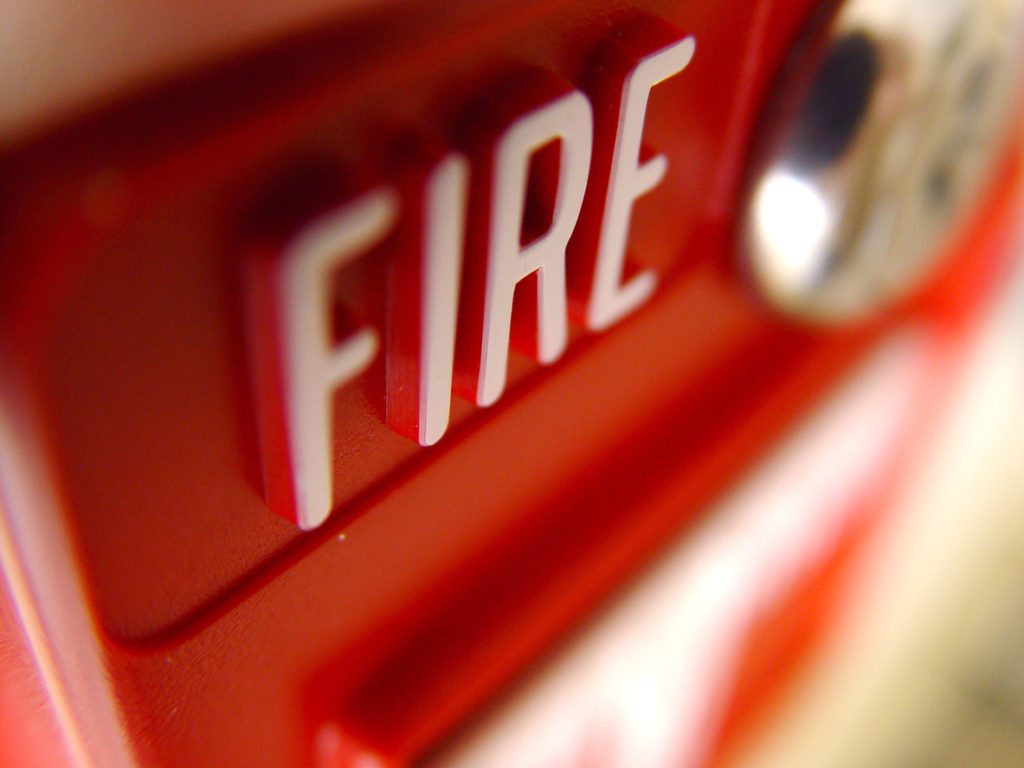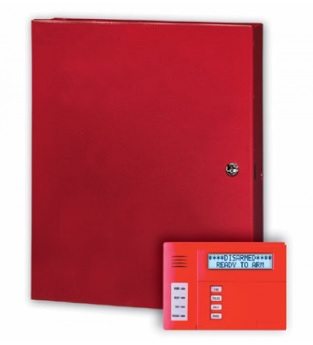Commercial Building Fire Alarm Panels and Systems

Typically used in commercial properties and other large buildings, fire alarm control panels (FACPs) act as a single control point for multiple fire detection devices like smoke detectors, heat detectors, and flame detectors. The FACP relays information between strategically placed devices and in order to alert people of a fire and smoke. The FACP can also trigger fire suppression systems (such as water sprinklers) and control building access points, HVAC systems, and elevators in order to isolate the fire and smoke, acting as a comprehensive fire access control panel. In this article, we’ll take a look at the different types of FACPs and which environments they are most appropriate for, as well as touch on important aspects like evacuation plans, fire drills, and building code compliance.
Types of Commercial Fire Alarm Panels
Fire alarm control panels fall into two general categories: conventional fire alarm systems (FACPs) and addressable fire alarm panels (FACPs).
Both types of panels link fire alarm system components such as smoke detectors, heat detectors, sprinklers, and fire suppression systems, but they differ in how they identify the location of a fire. These systems often include pull stations, strobe lights, and audible alarms to ensure comprehensive fire safety.
Below, we’ll take a look at the features and advantages of each FACP as well as which building types they are best suited to.
Conventional Commercial Fire Alarm System Control Panels FACPs
Conventional ULC fire alarm control panels divide a building into “zones” with hardwired connections to addressable smoke detectors. Each fire and smoke detection device is hard-wired individually into the panel. If a fire or smoke is detected, the panel will identify the zone in which the detection device was triggered. Conventional FACPs are less expensive than addressable FACPs, but can still be costly to install. This type of FACP is best suited to medium-sized buildings like shops, restaurants, and apartment complexes. These systems may also include backup power systems to ensure continuous operation during power outages.
Addressable Fire Alarm Panels (FACPs)
Unlike conventional FACPs, addressable commercial fire alarm control panels pinpoint the precise location of a fire and smoke detection device that has been triggered, enhancing building fire alarm panel effectiveness. While the initial cost of an addressable FACP is higher than that of a conventional FACP, addressable commercial fire alarm panels are much easier to install, integrating smoothly with existing commercial fire alarms systems. Addressable FACPs are best suited to larger buildings like office complexes, arenas, entertainment venues, and other environments in which very specific fire safety regulations must be adhered to. These systems often incorporate voice evacuation systems and can be integrated with building management systems for enhanced safety and efficiency.
Other features and advantages of Addressable FACPs include:
- A more sophisticated control panel – Addressable panels are more flexible and allow more control over the fire alarm system than conventional FACPs
- More reliable – All fire detection devices are wired into the panel using loop isolation modules. This way, signals can still reach the panel if a circuit breaks or some other damage occurs.
- Fewer false alarms – Addressable FACPs can monitor the air flow through smoke detection devices as check for dust particles that could falsely activate the device.
- Integration with smoke control systems and elevator recall systems for comprehensive fire safety

Do I Need a Fire and Smoke Panel Monitoring Service for My Building?
In general, fire and smoke alarm panels are recommended for medium to large sized buildings, multiple-occupancy apartment buildings, and commercial properties in Edmonton, Alberta. It’s important to consult with a fire marshal to ensure your system meets all local requirements, including proper installation of fire doors and smoke curtains where necessary.
By law, your building must be monitored for fire if:
- The building is six stories or higher
- It has a liquor license (LLBO)
- The building’s capacity is over 300 people
- There are combustibles contained within the building
- The building has a sprinkler system
- The Authority Having Jurisdiction(AHJ) requires the building to be monitored
Even if your building in Edmonton or Alberta isn’t required by law to be monitored, it’s still a good idea to consider a fire alarm panel monitoring service. Commercial fire and smoke alarms systems are designed to detect fires and get people out of a building safely, but they do not automatically communicate with the fire department. Without a monitoring service, the fire department won’t be notified of an emergency unless someone on the premises remembers to do so. Having a monitoring service ensures that emergency services will be dispatched if your fire alarm system is activated.
What is a CAN/ULC-S561 Listing? Do I Need One?
A CAN/ULC-S561 listing, or certificate, is a document issued by the Underwriters’ Laboratories of Canada, an independent, not-for-profit product safety testing, inspection, and certification organization. This certificate is proof that a building’s fire alarm or sprinkler system is being monitored in accordance with ULC standards, which specify how fire detection equipment should be installed, inspected, and maintained. The CAN/ULC-S561 standard also governs how fire and smoke alarm signals are transmitted to a Signals Receiving Centre (SRC).
If your building is required by Canada’s Fire Code and Building Code to be monitored for fire, you’ll want to be sure that your monitoring service meets the CAN/ULC-S561 standard. Not only do ULC-certified alarm monitoring services promise faster response times and fewer false alarms, but they also offer the highest quality of fire safety technology available.
Keep Your Commercial Property & Employees Safe
The rigorous process an alarm monitoring company must undergo in order to become ULC-certified ensures that the proper procedures and responses will always be followed when fire signals are received, and that your building’s fire alarm system will always be in good working order. This includes regular fire alarm testing procedures and maintenance schedules to ensure optimal performance. Additionally, fire safety training for employees and ensuring emergency responder radio coverage are crucial components of a comprehensive fire safety plan.
TELSCO has been helping business owners and managers with fire panel monitoring since 1970. We stay up-to-date with the latest fire alarm system software updates to provide you with the most advanced protection available.
As we know, fires are destructive and very dangerous to employees and building tenants. Learn how we can ensure the safety of your employees and protection of your property, contact us today.
Key Takeaways on Commercial Fire Alarm Control Panels (FACPs)
- Fire alarm control panels (FACPs) serve as central management systems, linking fire detection devices to relay alerts, activate suppression systems, and control building functions like access points and HVAC to contain fires.
- There are two main types of FACPs: conventional panels, which detect the fire zone, and addressable panels, which provide precise location identification of triggered devices.
- Conventional FACPs are cost-effective and best suited for medium-sized buildings like shops and restaurants, whereas addressable FACPs are ideal for large facilities needing pinpoint fire detection accuracy.
- Addressable commercial fire alarm panels are advanced systems that reduce false alarms and integrate with smoke control and elevator recall, enhancing safety in complex building layouts.
- Fire panel monitoring is crucial for buildings with specific legal requirements, such as those six stories or higher, with high occupancy, or containing combustibles, to ensure timely emergency response.
- The CAN/ULC-S561 certification signifies compliance with Canadian standards for commercial fire alarm monitoring, guaranteeing high-quality safety protocols and faster response times in case of emergencies.
- Fire safety plans for commercial buildings should include regular testing, maintenance, and employee training on evacuation and emergency procedures to maintain optimal fire protection.